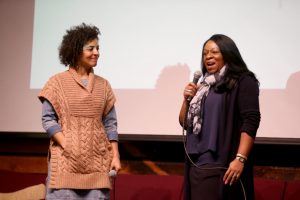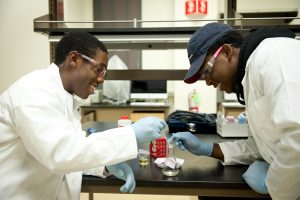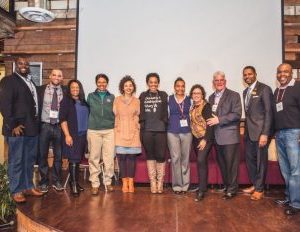In the News
For press inquiries, please email press@smash.org.
A Reimagined SMASH to Drive Tomorrow’s Tech Future
After 20+ years of groundbreaking and impactful efforts to build a strong and diverse STEM workforce, SMASH has achieved an impressive track record of impact. Read More
Reimagining SMASH
For over 20 years at SMASH, our goal has remained the same – to ensure that every student, regardless of the zip code they grew up in, has the opportunity to participate and thrive in the global economy. We have prepared thousands of scholars and alumni to flourish in STEM education, careers, and have dramatically grown our reach and impact over the last two decades.
Creating ‘intentional pipeline’: Raytheon supporting STEM program for students of color to help diversify workforce
 Two organizations have joined forces with one shared goal in mind: building an “intentional pipeline” to get more students of color into tech. For the next five years, Raytheon Technologies, which specializes in aerospace and defense, will contribute nearly $8 million to support scholarships, internships and mentoring for high school students of color participating in the Kapor Center’s SMASH (Summer Math and Science Honor Academy) program. Learn More
Two organizations have joined forces with one shared goal in mind: building an “intentional pipeline” to get more students of color into tech. For the next five years, Raytheon Technologies, which specializes in aerospace and defense, will contribute nearly $8 million to support scholarships, internships and mentoring for high school students of color participating in the Kapor Center’s SMASH (Summer Math and Science Honor Academy) program. Learn More
SMASH Named Winner of the 2020.ORG Impact Awards
 SMASH will receive a $5,000 USD donation to the charity of their choice and will be honored today as part of the “10 Days of .ORG” online experience that celebrates the range of achievements that have healed, inspired, transformed and connected communities over the past year. Learn More.
SMASH will receive a $5,000 USD donation to the charity of their choice and will be honored today as part of the “10 Days of .ORG” online experience that celebrates the range of achievements that have healed, inspired, transformed and connected communities over the past year. Learn More.
Tech Time: Detroit teen talks fighting through COVID-19
 SMASH x Wayne State scholar Arika Harvey talks about surviving her battle against coronavirus as well having some family members who have passed away from it. Watch here.
SMASH x Wayne State scholar Arika Harvey talks about surviving her battle against coronavirus as well having some family members who have passed away from it. Watch here.
Tech Time: SMASH Academy expands services amid COVID-19
 As COVID-19 has shut down schools and campuses across the country, Local 4 News Click On Detroit covers SMASH Program leveraging virtual technology to adapt its services for students. Learn more.
As COVID-19 has shut down schools and campuses across the country, Local 4 News Click On Detroit covers SMASH Program leveraging virtual technology to adapt its services for students. Learn more.
University of Michigan Engineering Partners With SMASH

We are thrilled to announce that SMASH Michigan will hold its first cohort of 35 students in summer 2020 at University of Michigan Engineering! More here.
FREE Morehouse Program Gets High School Students Ready For STEM Careers

SMASH Academy 2020 applications are now open! Our very own SMASH Morehouse Site Director Dr. Brian Garrett gives the full down low on WSB-TV Atlanta. Watch here.
All-Male Summer STEM Program Seeks Candidates Of Color for 2020 Class
 SMASH Morehouse, an all-male summer STEM program at Morehouse College, seeks candidates of underrepresented communities for 2020 class. More here.
SMASH Morehouse, an all-male summer STEM program at Morehouse College, seeks candidates of underrepresented communities for 2020 class. More here.
Interview with SMASH Wayne State
 Take a listen to SMASH Wayne State scholars and SMASH Midwest Site Director John Ray on stories of their wonderful accomplishments inside and out of the SMASH program! Listen here.
Take a listen to SMASH Wayne State scholars and SMASH Midwest Site Director John Ray on stories of their wonderful accomplishments inside and out of the SMASH program! Listen here.
WVON: The Talk of Chicago – SMASH Illinois Scholars
 SMASH Illinois Site Director Tracie Screven and her scholars share some inside scoop about their 2019 SMASH Academy experience. Listen into what drew these scholars to SMASH, their career goals after high school, and more!
SMASH Illinois Site Director Tracie Screven and her scholars share some inside scoop about their 2019 SMASH Academy experience. Listen into what drew these scholars to SMASH, their career goals after high school, and more!
STEM Learning a ‘SMASH’ at UC Davis
 “Before SMASH, I wasn’t really focused on issues going on right now, but Dr. Bronner’s class brought me the awareness of sustainability: social, economic and environmental,” said class member Elisama. “I enjoyed finding solutions to problems going on in my own community.” More here.
“Before SMASH, I wasn’t really focused on issues going on right now, but Dr. Bronner’s class brought me the awareness of sustainability: social, economic and environmental,” said class member Elisama. “I enjoyed finding solutions to problems going on in my own community.” More here.
SMASH Illinois, a Free STEM Program for Students of Color Launches
 “It’s a STEM program and I really wanted more science and math and engineering,” Torres said. “I’m not really good at math and here they’re really helping me develop those math skills.” More here.
“It’s a STEM program and I really wanted more science and math and engineering,” Torres said. “I’m not really good at math and here they’re really helping me develop those math skills.” More here.
Getting More Kids in STEM
 Minority students have the opportunity to put their stem skills to the test with a free national program that’s made its way to Illinois. Brandon Pope was at Illinois Tech with more. More here.
Minority students have the opportunity to put their stem skills to the test with a free national program that’s made its way to Illinois. Brandon Pope was at Illinois Tech with more. More here.
At a summer program where community comes first, STEM education thrives
 German Jimenez, who will be a junior at a public high school called Life Academy in Oakland this fall, was busy this summer at SMASH designing ways to reduce air pollution in the San Francisco Bay Area. More here.
German Jimenez, who will be a junior at a public high school called Life Academy in Oakland this fall, was busy this summer at SMASH designing ways to reduce air pollution in the San Francisco Bay Area. More here.
SIU Carbondale welcomes top minority high schoolers from across the state for STEM camp
 “We all know that the face of STEM is not what we want to see,” SIUC Chancellor John Dunn told the students. “We need more brown. We need more black. We need to have the opportunity to open the human potential that’s there in every person.” More here.
“We all know that the face of STEM is not what we want to see,” SIUC Chancellor John Dunn told the students. “We need more brown. We need more black. We need to have the opportunity to open the human potential that’s there in every person.” More here.
Google, with second largest philanthropic footprint in Bay Area, sets sights on STEM education
 Google.org’s support of SMASH Academy, a three-year STEM-intensive residential college prep program, is one of the avenues the tech giant is investing in the future of the Bay Area. More here.
Google.org’s support of SMASH Academy, a three-year STEM-intensive residential college prep program, is one of the avenues the tech giant is investing in the future of the Bay Area. More here.
SMASH and Akamai Technologies partner with Northeastern to immerse diverse high school students in stem
 Dean of the Khoury College of Computer Sciences, Carla Brodley, emphasizes the multifaceted nature of the partnership with Akamai and SMASH. “We are excited about the SMASH Northeastern partnership. More here.
Dean of the Khoury College of Computer Sciences, Carla Brodley, emphasizes the multifaceted nature of the partnership with Akamai and SMASH. “We are excited about the SMASH Northeastern partnership. More here.
Seven CCHS students chosen for inaugural STEM Program
 “The biggest thing that comes out of this is that the kids that finish the program … over 85 percent of them then go on to college, and they graduate with a STEM degree,” CCHS principal Ryan Thomas said. “That’s huge. More here.
“The biggest thing that comes out of this is that the kids that finish the program … over 85 percent of them then go on to college, and they graduate with a STEM degree,” CCHS principal Ryan Thomas said. “That’s huge. More here.
A Guide to Wharton’s Summer Programs- New faces and fresh ideas on campus in the not-so-quiet off-season
 SMASH students are prepped in STEM subjects they’ll encounter in college and take intro courses like statistics or economics. U.S. News & World Report has called SMASH “perhaps the most ambitious program” to encourage African-American and Latino students in STEM fields. More here.
SMASH students are prepped in STEM subjects they’ll encounter in college and take intro courses like statistics or economics. U.S. News & World Report has called SMASH “perhaps the most ambitious program” to encourage African-American and Latino students in STEM fields. More here.
WVON: The Talk of Chicago! – Tracie Screven
 Tracie Screven is the Site Director for SMASH at Illinois Institute of Technology. She joins WVON to talk about the partnership SMASH has with the Institute of Technology and CPASS Foundation. Listen here.
Tracie Screven is the Site Director for SMASH at Illinois Institute of Technology. She joins WVON to talk about the partnership SMASH has with the Institute of Technology and CPASS Foundation. Listen here.
SIU partners with SMASH Academy to bring STEM opportunities to high school students
 Meera Komarraju, Provost and Vice Chancellor for Academic affairs, said the program is not only focused on science technology, engineering or math, but also helps students with design thinking, creative problem solving, leadership and college prep. She said the best part of the program is it provides mentoring and support for the students. More here.
Meera Komarraju, Provost and Vice Chancellor for Academic affairs, said the program is not only focused on science technology, engineering or math, but also helps students with design thinking, creative problem solving, leadership and college prep. She said the best part of the program is it provides mentoring and support for the students. More here.
Illinois Schools and Kapor Center Launch All Expenses Paid Illinois SMASH Academy STEM Tech Camp for Teens from Underrepresented Groups
 The Kapor Center has already established SMASH academies in California, Georgia, Pennsylvania, and Michigan. According to the center’s data, every SMASH student graduates high school and 91 percent earn a college degree within five years, 31 percentage points higher than the national rate. More here.
The Kapor Center has already established SMASH academies in California, Georgia, Pennsylvania, and Michigan. According to the center’s data, every SMASH student graduates high school and 91 percent earn a college degree within five years, 31 percentage points higher than the national rate. More here.
SMASH STEM Program launched in Illinois
 SMASH, the signature STEM education program of the Kapor Center, announces SMASH Illinois, its first statewide initiative program partnership with Illinois Institute of Technology (Illinois Tech), Southern Illinois University (SIUC) Carbondale, and the Creating Pathways and Access for Student Success (CPASS) Foundation. More here.
SMASH, the signature STEM education program of the Kapor Center, announces SMASH Illinois, its first statewide initiative program partnership with Illinois Institute of Technology (Illinois Tech), Southern Illinois University (SIUC) Carbondale, and the Creating Pathways and Access for Student Success (CPASS) Foundation. More here.
Illinois College to Mentor Top Minority Students in Technology
 Southern Illinois University Carbondale has teamed up with tech mogul Mitch Kapor to place 70 underprivileged high school students in an all-expense paid STEM camp this coming summer. More here.
Southern Illinois University Carbondale has teamed up with tech mogul Mitch Kapor to place 70 underprivileged high school students in an all-expense paid STEM camp this coming summer. More here.
SIUC to mentor Illinois’ top minority students in tech
 Southern Illinois University Carbondale leaders stood alongside a Californian tech mogul and Illinois’ new lieutenant governor, Juliana Stratton, in downtown Chicago to announce a program that will change the lives of kids in Southern Illinois. More here.
Southern Illinois University Carbondale leaders stood alongside a Californian tech mogul and Illinois’ new lieutenant governor, Juliana Stratton, in downtown Chicago to announce a program that will change the lives of kids in Southern Illinois. More here.
Wake Up With WURD – LaToya Tufts
 LaToya Tufts is the SMASH Wharton Site Director. She joins Wake Up With WURD to talk about the partnership that SMASH has with the Wharton School at the University of Pennsylvania and to talk about the application process. The program works to provide rigorous science, technology, engineering and mathematics (STEM) programming to students of color in the greater Philadelphia metro area. Listen here.
LaToya Tufts is the SMASH Wharton Site Director. She joins Wake Up With WURD to talk about the partnership that SMASH has with the Wharton School at the University of Pennsylvania and to talk about the application process. The program works to provide rigorous science, technology, engineering and mathematics (STEM) programming to students of color in the greater Philadelphia metro area. Listen here.
Houston conference empowers women of color in STEM fields
 Late’jah Whittaker has always loved science. She started making robots in the fourth grade. In the fifth grade, she attended her first computer science-based program, learning how to program and make games. In high school, she excitedly registered for an Advanced Placement computer science course. But when she walked into class for the first time, she was shocked. More here.
Late’jah Whittaker has always loved science. She started making robots in the fourth grade. In the fifth grade, she attended her first computer science-based program, learning how to program and make games. In high school, she excitedly registered for an Advanced Placement computer science course. But when she walked into class for the first time, she was shocked. More here.
City of Detroit | Mayor’s Office: Wayne State-based program seeks to close diversity gap in STEM fields
 Slowly but surely, Detroit is becoming a hub for technology and innovation. With large-scale STEM (Science, Technology, Engineering and Math) conferences such as this month’s AfroTech and the 2019 National Society of Black Engineers convention eyeing Detroit as their host city, diversity in the field has become a major talking point. More here.
Slowly but surely, Detroit is becoming a hub for technology and innovation. With large-scale STEM (Science, Technology, Engineering and Math) conferences such as this month’s AfroTech and the 2019 National Society of Black Engineers convention eyeing Detroit as their host city, diversity in the field has become a major talking point. More here.
Penn Today: At Penn, STEM and business classes mesh for Philadelphia high schoolers
As part of the SMASH Wharton program, 35 students live and breathe college life in the summer, staying for three years in Harnwell College House and taking classes at Huntsman Hall. More here.
Tech Time: Smash STEM Academy at Wayne State University
A learning opportunity for local high school students at Wayne State University — Smash Academy is a five-week STEM camp that take students through biology, computer science and math courses. Watch here.
TechCrunch | CTRL+T podcast: Diversity and its discontents
On this episode of CTRL+T, Megan Rose Dickey chats with Dr. Jennifer Cohen of the Level Playing Field Institute, an organization that aims to improve access and increase opportunity for people of color in the fields of science, technology, engineering and mathematics. Listen here.
Upworthy: This program has a brilliant plan for bringing diversity to the world of STEM
 When Dr. Jennifer R. Cohen was working as a molecular biologist, she often wondered why no one else in her sector looked like her.
When Dr. Jennifer R. Cohen was working as a molecular biologist, she often wondered why no one else in her sector looked like her.
As a black woman, Cohen is not the typical face you’d see in a biochemistry lab. The sad reality is science and technology careers are still predominately assumed by white men even though there is a large reservoir of untapped talent among women and people of color. More here.
Univision: UTEC visita SMASH Stanford
Univision stopped by SMASH at Stanford this summer to interview and highlight some of our scholars and the program in the South Bay.
A first for our SMASH program, this segment was produced in Spanish! You’ll see 4 of our SMASH Stanford scholars and our SMASH Program Director, William Cardenas, featured in this video clip. Watch here.
Los Angeles Wave: UCLA summer program is a SMASHing success

Students from high schools throughout Los Angeles were applauded by family members and teachers during UCLA’s SMASH Graduation and Recognition Ceremony July 29. In one STEM class this year, students merged their learning of computer science with research about contagious diseases. More here.
New Resource Bank | Blog: Meet the Organization Addressing Inclusion One Student at a Time
Ninth graders who apply for the Level Playing Field Institute’s SMASH Academy – an intensive summer program to teach science and math skills to underrepresented students of color – go through a rigorous process similar to a college application. They write an essay, get interviewed, submit references, and take a math test; only 20% are admitted. But for those who make it, the experience is transformative, according to LPFI CEO Eli Kennedy. “We look for students with a deep interest in STEM (science, technology, engineering, and math) but who have not recognized their potential,” Kennedy says. “We want to change their trajectory so they go onto college.” More here.
SF Chronicle: Teaching tech helps bridge the digital divide
![]()
Major tech companies have blamed the lack of diversity in their workforce on a “pipeline problem,” meaning a lack of available talent. To address the vacuum, an increasing number of nonprofit programs are focused on expanding the representation of minorities in the tech sector.
These nonprofits are picking up the slack in an area where California public schools have lacked either the resources or the foresight to prepare students for this vibrant sector. More here.
Los Angeles Sentinel: UCLA SMASH Program Preparing Students for Tech America
“The consistent thing we hear from the Facebooks and Googles of the world is that they are not able to identify young talented people of color,” explained Eli Kennedy CEO of the Level Playing Field Institute, the organization that heads up the Summer Math and Science Honors program at UCLA.
“At the same time, we’re seeing job growth in America being driven by the tech sector.”
Low income students of color need the SMASH program to be able to compete, he said.
That is why, according to program officials, SMASH is free of charge.
Read more here in the Los Angeles Sentinel.
Atlanta Black Star: Morehouse Launches Successful Summer STEM Program that Puts Atlanta-Area Teens On Path to New Careers
When 28 high school-age boys signed up to participate in the first year of a STEM program at Morehouse College, they could never have predicted the bond that would develop among them.
STEM (science, technology, engineering and math) careers are predicted to continue to grow according to the U.S. Department of Commerce’s Economics and Statistics Administration, but nonwhite young men ― especially Black ones ― are some of the least represented.
Read more here from in the Atlanta Black Star.
Atlanta Journal-Constitution: Metro Atlanta students learning STEM to help themselves and others
About two dozen metro Atlanta public school students are spending much of their summer vacation on a college campus learning skills their instructors and organizers believe will help them improve academically and help others.
The students are the first local participants in a five-week science, technology, engineering and math (STEM) camp at Morehouse College that includes a social justice component. Organizers said the camp’s goal is to get the students, all rising tenth-graders, to begin thinking about solutions to problems impacting under-served communities.
Read more here in the Atlanta Journal-Constitution.
The Color of STEM: Jennifer R. Cohen, Ph.D | SMASH Berkeley Site Director
About two dozen metro Atlanta public school students are spending much of their summer vacation on a college campus learning skills their instructors and organizers believe will help them improve academically and help others.
The students are the first local participants in a five-week science, technology, engineering and math (STEM) camp at Morehouse College that includes a social justice component. Organizers said the camp’s goal is to get the students, all rising tenth-graders, to begin thinking about solutions to problems impacting under-served communities.
Read more here in the Atlanta Journal-Constitution.
Black Enterprise: #BlackSTEMLikeMe Takes Over the Impact Hub
In an evening full of total engagement, immersed in the likes of entrepreneurs, astronauts, National Society of Black Engineers’ leaders and students, the #BlackSTEMLikeMe hashtag rang loud and clear.
We were met with stories of trials and triumphs, but they didn’t end on the stage. A clip was shown, we heard from speakers, and then the attention was turned to the audience. It was our turn. Topics surfaced like: explain a time when you were the “Hidden Figure” to give an example of when you had to take an active leadership position and make some less than desirable decisions.
Talk about vulnerability. Read more here in Black Enterprise.
East Bay Times: ‘Hidden Figures’: Can film inspire more young black women to embrace science, tech?

Danielle Rose, of Level Playing Field Institute, left, and Toni Vanwinkle, of Adobe, speak during a panel discussion hosted by the National Society of Black Engineers at Impact Hub in Oakland, Calif., on Thursday, Feb. 2, 2017. Hidden Figures cast member Karan Kendrick among other was one of the panelists who spoke, too. The film is based on the story of three African-American women working at NASA in the early 1960s. (Ray Chavez/Bay Area News Group)
The movie tells the story of Katherine G. Johnson, Dorothy Vaughan and Mary Jackson, African-American women working at NASA who served as some of the brains behind John Glenn’s historic orbit of Earth in 1962.
And similar film screenings and forums are being held throughout the country, with high hopes that the film will galvanize interest in science, technology, engineering and mathematics — also known as STEM — in minority girls and boys….
Jennifer R. Cohen, site director of SMASH Berkeley, which is a free Summer Math and Science Honors Academy at UC Berkeley offered to underrepresented high school students of color, said her nonprofit has also been hosting screenings of the film, and it’s been inspiring to see young people’s response.
“They were saying we didn’t even know this was a part of history and part of space exploration. This has been a story of national pride, for many black women,” she said.
Read more here in the East Bay Times.
KBLX 102.9FM: KBLX Cares with Sterling James
LPFI Communications Manager/SMASH Alum, Ashleigh Richelle and Site Director of SMASH Stanford, Gabriel Chaparro came to our studios to discuss the SMASH program offered to underrepresented High School students as a free college preparatory STEM-Intensive Summer Math And Science Honors Academy program. Listen or visit here.
KTVU Ch. 2: Level Playing Field – Getting kids interested in science
LPFI Communications Manager/SMASH Alum, Ashleigh Richelle and Site Director of SMASH Stanford, Gabriel Chaparro came to our studios to discuss the SMASH program offered to underrepresented High School students as a free college preparatory STEM-Intensive Summer Math And Science Honors Academy program. Listen or visit here.
Bay Area Parent: How to Get Your Kids Excited About STEM

Dr. Jennifer R. Cohen and Eli Kennedy work at the Level Playing Field Institute (new.lpfi.org), a nonprofit that provides free educational programs and resources to support underrepresented minority students in the Bay Area and help them pursue STEM careers.
“When I was in elementary school (Lakeshore Elementary School in San Francisco), my mother would tell me all the time that I will make a great scientist,” Cohen says. “My mother was a stay-at-home mom at the time, and although we didn’t know any scientists, I believed her when she told me I could and would be a great scientist.”
Read more here in Bay Area Parent about how parents can encourage their children to get into STEM.
San Jose Mercury: Opinion | Federal aid needed for teaching coding, science in schools

Computer occupations are not only some of the fastest growing in California and the nation, but also among the highest paying. Yet, by 2022, the nation is projected to have 1.3 million unfilled jobs in these fields, many of which will be located in our state.
In large part, this shortfall is a consequence of the lack of access and disparities in access to computer science education in California. According to the Level Playing Field Institute, 65 percent of California public high schools offered no computer science courses in 2015; only 13 percent offered AP Computer Science.
Read more here at The San Jose Mercury.
Wharton Business Radio/Sirius XM: Dollars & Change

Listen to CEO Eli Kennedy’s interview on “Dollars & Change,” originally aired on Sirius XM Channel 111, Business Radio Powered by The Wharton School. Hosts are Katherine Klein and Nick Ashburn.











